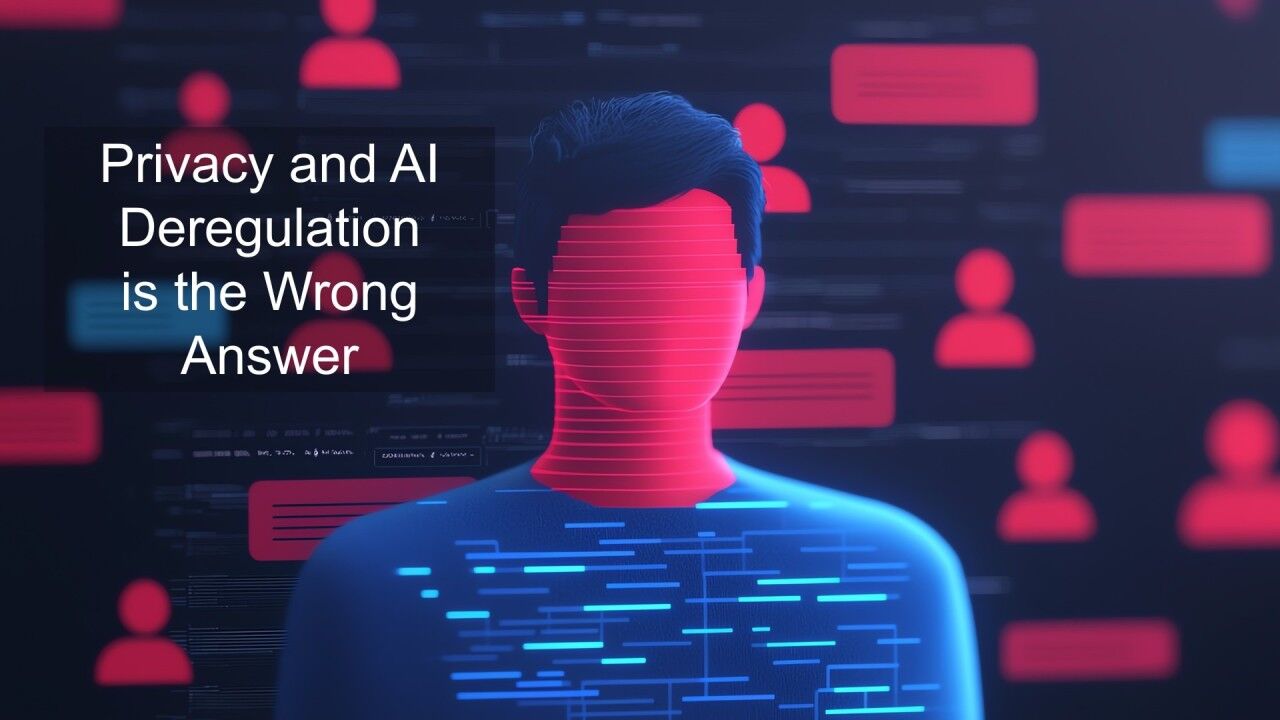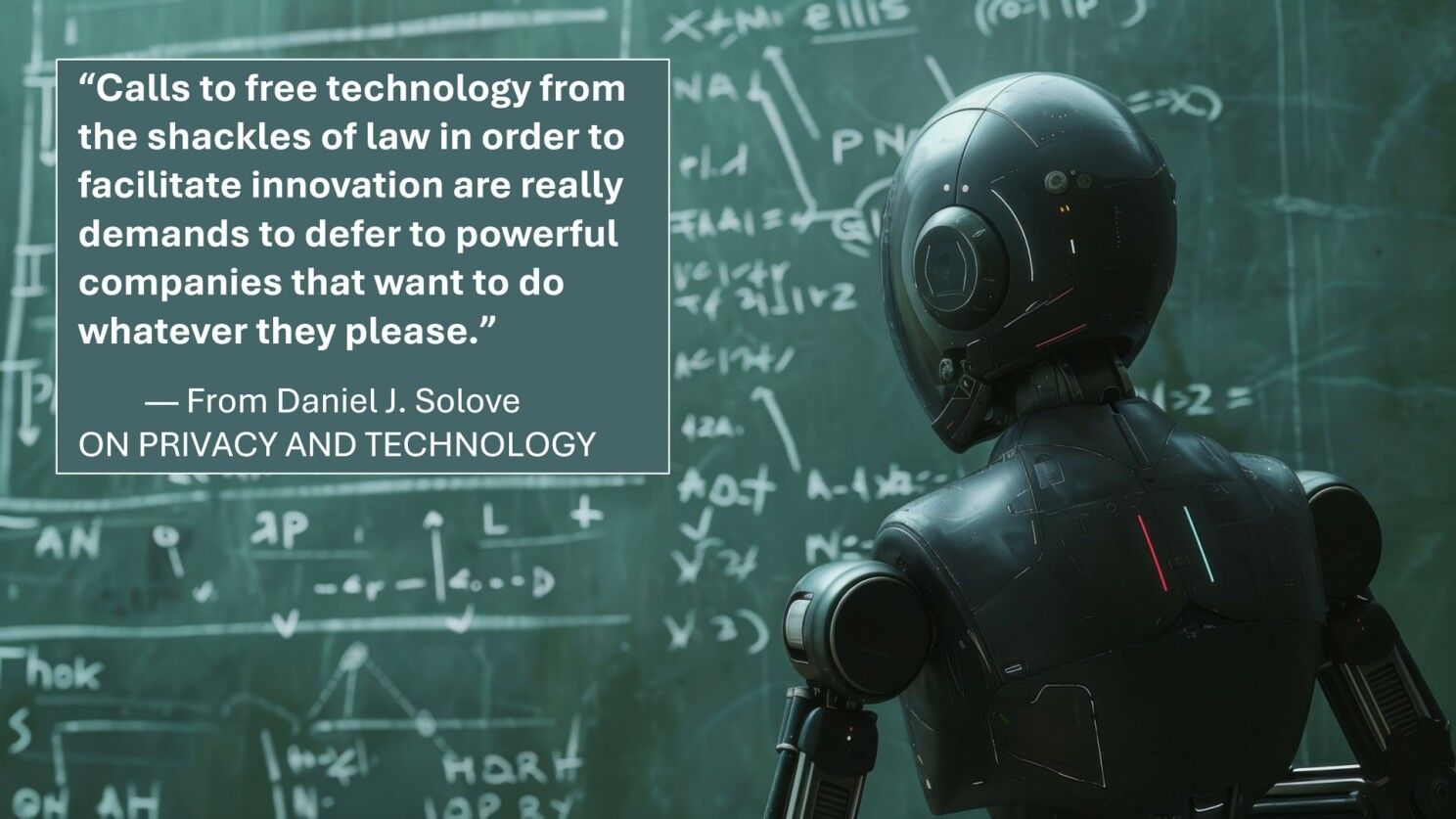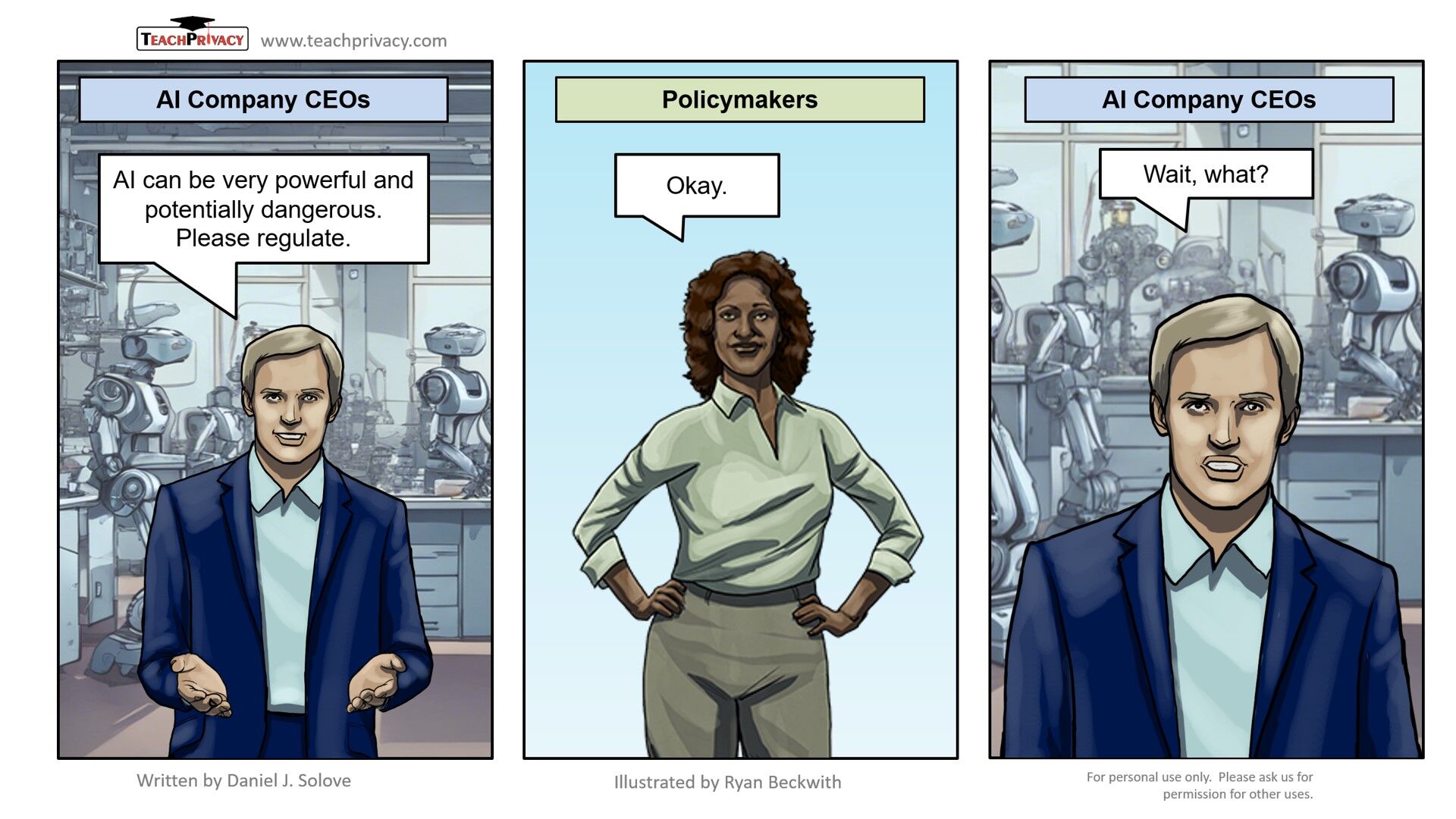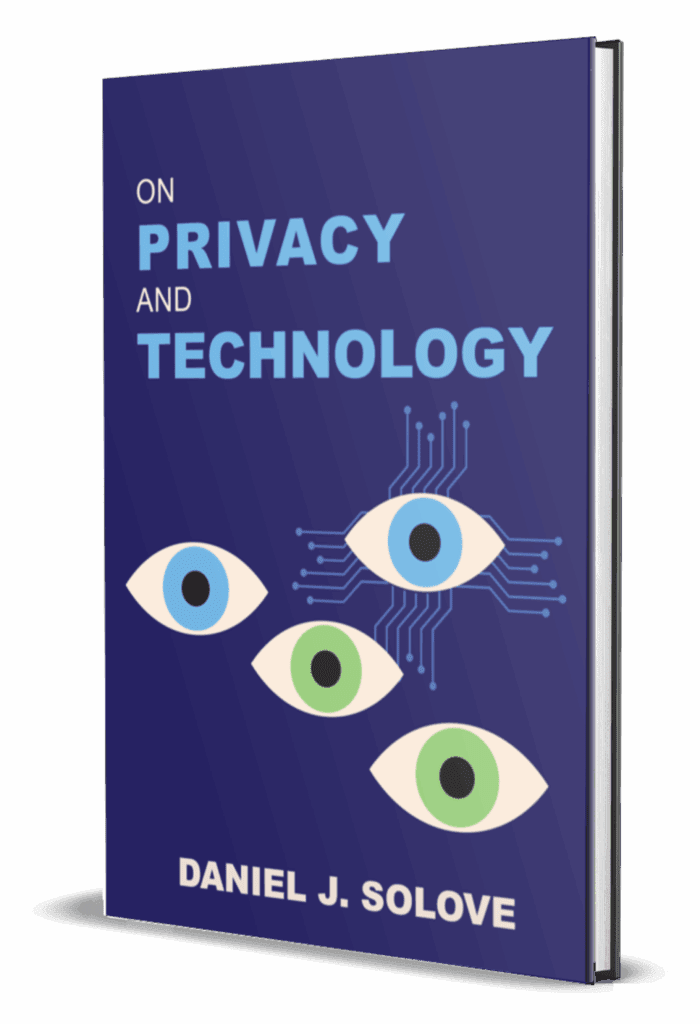
Lately, we’ve been witnessing the fast unfold of a deregulatory motion for privateness and AI. Spurred in vital half by the Trump Administration, the U.S. has began to decontrol expertise. The EU has caught the virus and has been considering weaking its regulation as nicely. As Luiza Jarovsky notes, some policymakers within the EU are aiming to “simplify” the GDPR and are more and more being lured by the siren cries of tech corporations complaining about EU regulation. For instance, the Draghi Report (Sept. 2024) complains that EU privateness and AI rules “create the danger of European corporations being excluded from early AI improvements” and recommends “light-handed guidelines.” In a terrific piece, Europe Might Lose What Makes It Nice, Anu Bradford, R. Daniel Kelemen, and Tommaso Pavone concern that “the EU appears poised to commerce away its leverage as a worldwide regulatory superpower.”
AI Corporations – Please Regulate Us . . . Really, Please Don’t
In 2023, AI firm CEOs welcomed regulation. They wished to ameliorate considerations that AI was creating so shortly and recklessly. However now, their true colours have been revealed. Now that the winds have shifted towards deregulation, these corporations have modified their tune. Like practically all corporations, they by no means actually wished to be regulated; they simply wished to create the phantasm that had been being accountable and the mirage that there have been guardrails.
When the AI corporations initially known as for regulation, I wasn’t fooled, and so I created a cartoon.
The Delusion that Regulation Stifles Innovation
In my new e-book, ON PRIVACY AND TECHNOLOGY, I debunk a standard pernicious fable that regulation stifles innovation:
However the notion that innovation and regulation are oppositional is fake. Many organizations spend a pittance on privacy-law compliance as a share of total income. The simplest regulation usually includes holding the creators and customers of expertise accountable for the prices they foist on people and society.
The alchemy for innovation isn’t anemic regulation; as a substitute, it sometimes includes bringing collectively vivid, inventive folks, lots of whom need their work to do good. Silicon Valley in California, regardless of having a number of the strongest privateness legal guidelines, restrictive enterprise regulation, and excessive taxes, is the place many expertise corporations are born. These legal guidelines haven’t pushed the innovators away. Innovators are drawn to the Valley as a result of so many different innovators, engineers, and technologists are there – it’s the place the celebration is.
Regulation is usually a buddy of innovation, not a foe. Efficient regulation goals to forestall nightmares like Frankenstein’s monster, and it might probably assist steer organizations away from innovating within the incorrect path. Regulation may impede those that focus maniacally on constructing their applied sciences with out concern about what they break. Regulation protects corporations that innovate thoughtfully and responsibly by stopping corporations that don’t from having an unfair benefit.
Sadly, regulation is the incorrect bogeyman. The alchemy for innovation isn’t the absence of regulation. Within the U.S., the muse of innovation is a sturdy system of upper schooling, the place the federal government has funded science and expertise, resulting in profound breakthroughs. Practically every thing with the web and digital applied sciences at present traces again largely to innovations and discoveries from this basis – the partnership between increased schooling and the federal government. Upon this basis, innovation relies upon upon fostering the fitting setting for inventors, thinkers, and engineers — attracting them from around the globe, giving them the flexibility to create, fail, get better, and preserve making an attempt once more.
Regulation doesn’t stifle innovation – it steers it. What kills innovation is the destruction of its foundations and the setting that creates the circumstances for it to flourish. Right this moment, within the U.S., the very issues which have led to innovation are being smashed to items. The goose that lays the golden eggs is being slaughtered. Sadly, sooner or later, the U.S. possible received’t be a world chief in innovation anymore.
As Professor Anu Bradford has defined fairly thoughtfully in her article, The False Alternative Between Digital Regulation and Innovation, the EU lacks most of the world’s largest tech corporations not due to regulation however due to different elements, corresponding to difficulties acquiring funding and punitive chapter legal guidelines.

The EU Ought to Resist the Urge to Dismantle its Digital Tech Regulation
The EU has excelled at being the citadel of tech regulation. The EU has been the world’s conscience, and it has been remarkably profitable with creating regulation – which is a type of innovation, as Professor Joshua Fairfield aptly argues. Many approaches from the GDPR have unfold worldwide, together with to legal guidelines within the U.S. Lots of the practically 20 state client privateness legal guidelines have included ideas from the GDPR. US privateness legislation has moved nearer to EU regulation than vice versa.
Sadly, the EU is now having doubts about its most profitable undertaking. That is the purpose within the superhero film the place the hero loses the fortitude to stay on the hero’s path and begins moping round whereas the world careens into chaos.
The EU ought to keep the course and even strengthen its regulation. In ON PRIVACY AND TECHNOLOGY, I suggest some ways the GDPR and different legal guidelines will be improved to be more practical. Entering into the wrong way by weakening regulation won’t magically make innovation happen. As an alternative, it would simply weaken the EU’s management in regulation with no corresponding profit in innovation – thus making the EU much less related and fewer highly effective. That is precisely the incorrect path.
In my e-book, I write:
Why can’t corporations innovate to search out methods to observe the legislation? As a result of innovating with the intention to adjust to regulation is much less intoxicating than innovating for revenue, glory, or energy. For corporations, it is a matter not of can’t do however moderately of don’t need to do. Calls to free expertise from the shackles of legislation with the intention to facilitate innovation are actually calls for to defer to highly effective corporations that need to do no matter they please.
I hope that the EU, the U.S., and remainder of the world notice the true foundations and setting for innovation and don’t purchase into the canard that regulation stifles innovation. If this pernicious fable is believed, then we’ll have much less efficient regulation and in addition much less innovation – the worst of all worlds. No person likes a hero film the place the hero offers up and loses.
![]()
Daniel J. Solove is a legislation professor at George Washington College Legislation College and the main skilled on privateness and knowledge safety legislation. Solove has revealed 10 books, together with his newest e-book, ON PRIVACY AND TECHNOLOGY, and greater than 100 articles.
Order ON PRIVACY AND TECHNOLOGY right here
















